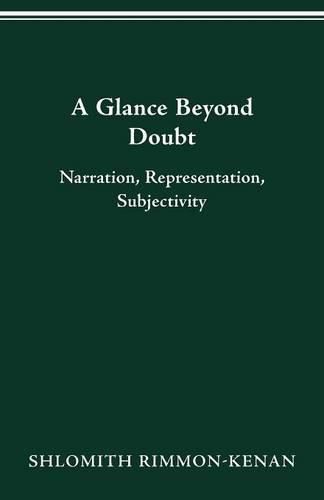Readings Newsletter
Become a Readings Member to make your shopping experience even easier.
Sign in or sign up for free!
You’re not far away from qualifying for FREE standard shipping within Australia
You’ve qualified for FREE standard shipping within Australia
The cart is loading…






This title is printed to order. This book may have been self-published. If so, we cannot guarantee the quality of the content. In the main most books will have gone through the editing process however some may not. We therefore suggest that you be aware of this before ordering this book. If in doubt check either the author or publisher’s details as we are unable to accept any returns unless they are faulty. Please contact us if you have any questions.
Can we talk responsibly about representation and subjectivity in the wake of postructuralism’s destabilization of these concepts, and if so, how? Shlomith Rimmon-Kenan answers the first question in the affirmative and answers the second not through an abstract theoretical discussion but by following the lead of twentieth-century narratives that have taken representation and subjectivity as their themes. The result is a move beyond both traditional notions of these concepts and the poststructuralist undoing of them. Focusing on William Faulkner’s Absalom, Absalom!, Vladimir Nabokov’s The Real Life of Sebastian Knight, Christine Brooke-Rose’s Thru, Samuel Beckett’s Company, and Toni Morrison’s Beloved, Rimmon-Kenan shows how modes of narration participate in the exploration of the problematics of representation and subjectivity. Her insightful analyses of the narrative strategies of these five novels demonstrate her point that narration itself provides a special access to representation and subjectivity. In addition, these analyses offer a compelling example of what it means to claim that we can treat narrative as theory. A Glance beyond Doubt thus provides an important methodological contribution to narrative studies while offering fresh and sophisticated readings of important modernist and postmodernist novels. Rimmon-Kenan’s work is valuable for students of narrative and of twentieth-century literature, and it has important implications for other disciplines now studying narrative, especially philosophy, historiography, psychoanalysis, and jurisprudence. Shlomith Rimmon-Kenan is professor of English and comparative literature at the Hebrew University of Jerusalem. She is the author of The Concept of Ambiguity: The Example of James and Narrative Fiction: Contemporary Poetics and the editor of Discourse in Psychoanalysis and Literature.
$9.00 standard shipping within Australia
FREE standard shipping within Australia for orders over $100.00
Express & International shipping calculated at checkout
This title is printed to order. This book may have been self-published. If so, we cannot guarantee the quality of the content. In the main most books will have gone through the editing process however some may not. We therefore suggest that you be aware of this before ordering this book. If in doubt check either the author or publisher’s details as we are unable to accept any returns unless they are faulty. Please contact us if you have any questions.
Can we talk responsibly about representation and subjectivity in the wake of postructuralism’s destabilization of these concepts, and if so, how? Shlomith Rimmon-Kenan answers the first question in the affirmative and answers the second not through an abstract theoretical discussion but by following the lead of twentieth-century narratives that have taken representation and subjectivity as their themes. The result is a move beyond both traditional notions of these concepts and the poststructuralist undoing of them. Focusing on William Faulkner’s Absalom, Absalom!, Vladimir Nabokov’s The Real Life of Sebastian Knight, Christine Brooke-Rose’s Thru, Samuel Beckett’s Company, and Toni Morrison’s Beloved, Rimmon-Kenan shows how modes of narration participate in the exploration of the problematics of representation and subjectivity. Her insightful analyses of the narrative strategies of these five novels demonstrate her point that narration itself provides a special access to representation and subjectivity. In addition, these analyses offer a compelling example of what it means to claim that we can treat narrative as theory. A Glance beyond Doubt thus provides an important methodological contribution to narrative studies while offering fresh and sophisticated readings of important modernist and postmodernist novels. Rimmon-Kenan’s work is valuable for students of narrative and of twentieth-century literature, and it has important implications for other disciplines now studying narrative, especially philosophy, historiography, psychoanalysis, and jurisprudence. Shlomith Rimmon-Kenan is professor of English and comparative literature at the Hebrew University of Jerusalem. She is the author of The Concept of Ambiguity: The Example of James and Narrative Fiction: Contemporary Poetics and the editor of Discourse in Psychoanalysis and Literature.